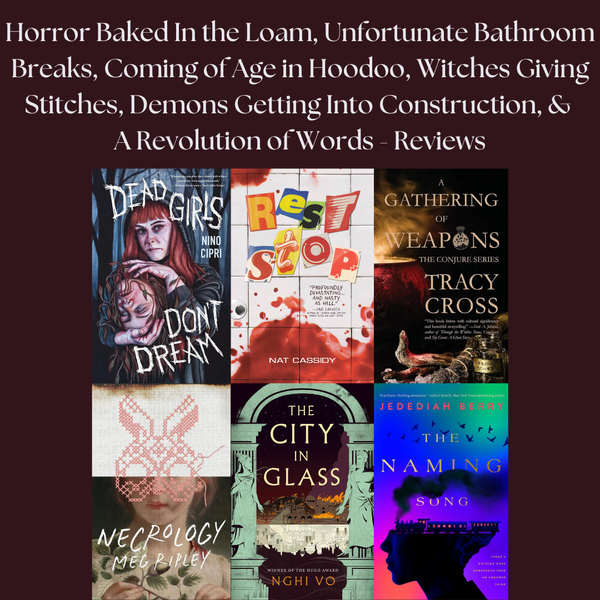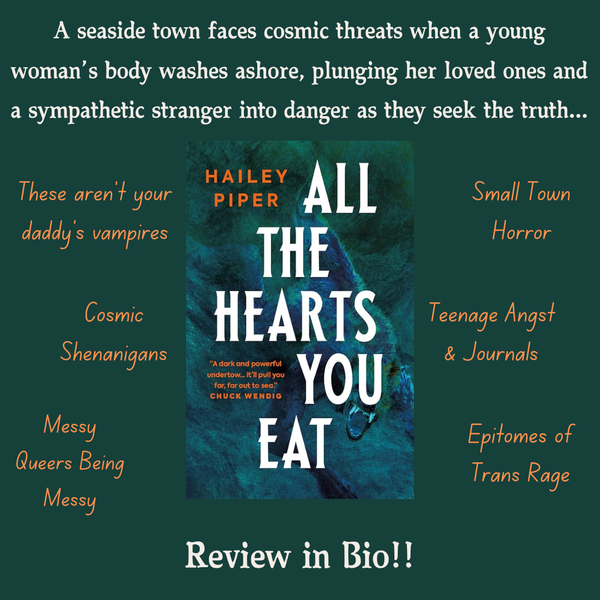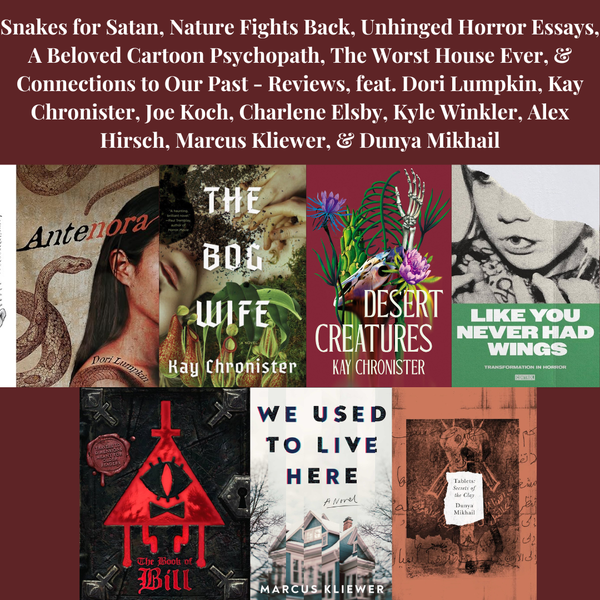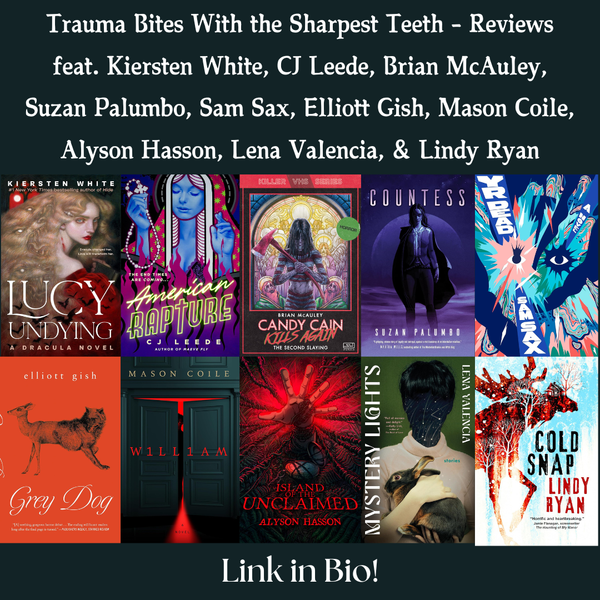The Painful Nostalgia of Suburbia - A Review of Gwendolyn Kiste's "The Haunting of Velkwood"
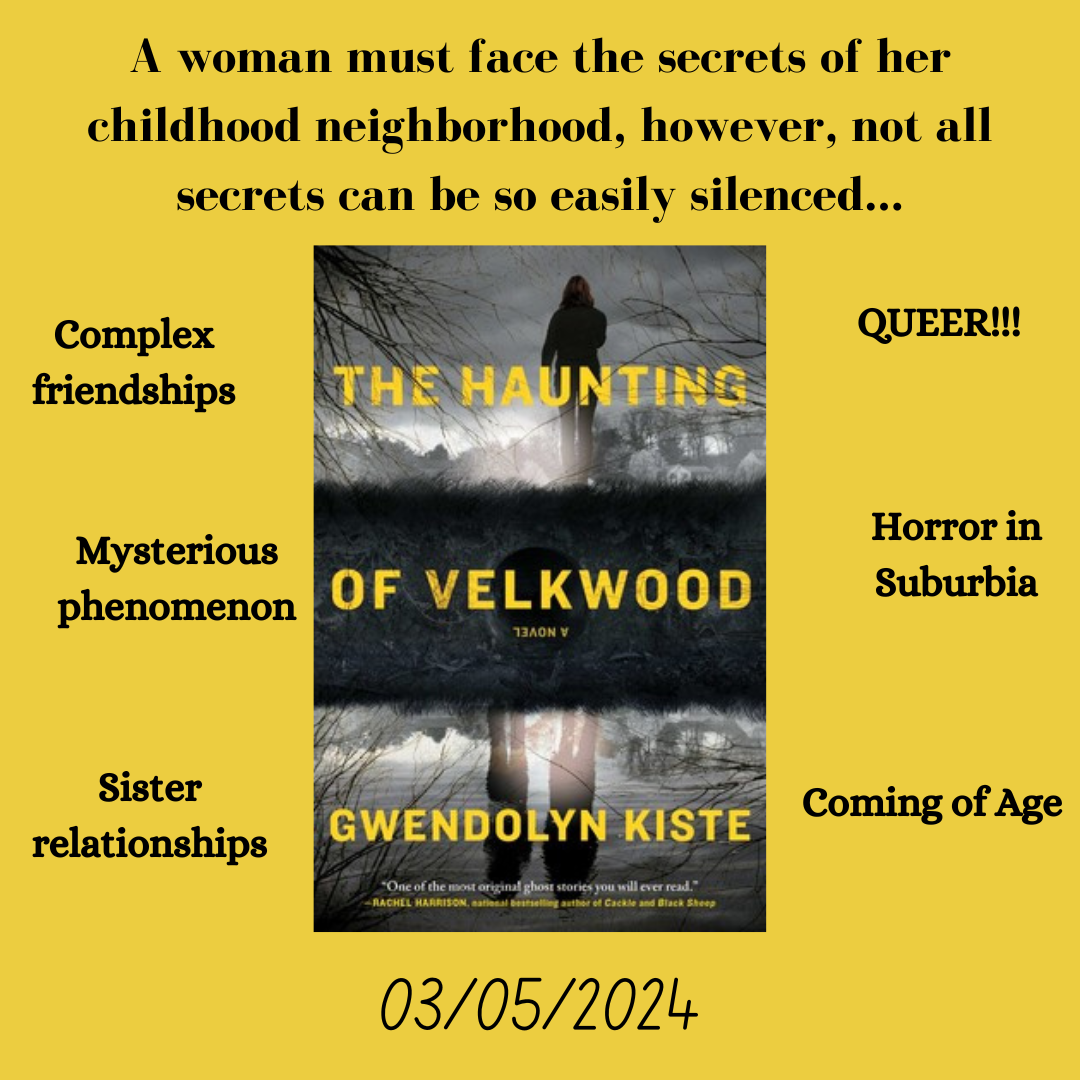
Pennsylvania is home to hundreds of weird and creepy places, people, and creatures. Weird Pennsylvania often sells just as much alongside its New Jersey counterpart in folklorist Matt Lake's encyclopedic series of all things strange and unusual. It's also home to some of the best contemporary horror writers, consistently pushing the boundaries of what we battle alongside fear. Whether it's the boundary shattering work of Samantha Kolesnik, the disturbed geniuses of Apocalypse Party Press, or the tender peculiarities of A.C. Ward, this state has been carrying its darkness since the displacement of the Lenni Lenape people, and likely even longer before that.
Another such superstar in the contemporary horror scene is Gwendolyn Kiste, whose nightmares have been finding larger and larger audiences since her Bram Stoker win with the relentlessly gorgeous heartbreaker, The Rust Maidens. Across short fiction and several novels and novellas, this Pittsburgh dream weaver proves time and time again that she not only harnesses the power to terrify and unsettle, but unrelenting emotion and empathy as well. Even within the Lambda Award winning Reluctant Immortals, which re-imagines some of the most maligned female literary characters of gothic history, a deep and rich understanding of human spirit, grief, and pain weaves throughout with a stunning radiance.
This year, Kiste unleashes a new gothic chiller with The Haunting of Velkwood. Immediately conjuring the likeness to Shirley Jackson's classic, the title is only slightly a misnomer in the sense that yes, this is a tale populated with ghosts. However, the haunting itself is far more individual than most haunting narratives of today. In fact, Velkwood almost seems to redefine "haunting" in a way that will feel all too familiar to those who have lived in suburban sprawl for much of their life.
What's so special about Suburbia?
That's an excellent question, and one not so easily answerable. Since their creation in 1946, suburbs serve as a social construction that used to signal quite a few things. Wealth, comfort, security, and so much more, suburbs were places to escape to when cities appeared to become "more dangerous." It's not uncommon to find mostly smiling Caucasian faces in suburbs and that is by design, being that redlining still exists to this day in many towns. As the end of the war gave rise to burgeoning homeownership, moving to the suburbs held a certain social capital that continues to rear its head today. Despite said capital, however, there are plenty of suburbanites that get lost in the capital shuffle, and this is largely what Velkwood points to in its dark depiction.
For many working-class folks, especially white millennials, suburbia was the place you sought to escape. All of those shiny futures depicted from the 50's gave way to economic downturn, financial anxiety, and feeling of being left behind on the wheel of progress. Suburbia was less a place of endless possibility and more a labyrinth where the closest fun you could experience was the mall twenty minutes away. It's an experience that either opened your eyes to the gross inequities of race and class in the United States, or comforted you in its "tough but humble" comforts. All's you knew was you and yer family were safe and that's all that matters!!
"Suburbia. We were supposed to be aspirational. We were supposed to be the American Dream incarnate. But that's the problem with dreams. They rarely come true the way you expect them to. / And besides, this wasn't even really the suburbs. This wasn't really anywhere. Out neighborhood was almost an hour away from the nearest city, too far to be anything but a nothing town." The Haunting of Velkwood, pg. 42
The "decline" of suburban social clout is much of what fanned the flames of the Emo and Pop Punk revivals of the late 00's and early 2010's. Scores of young and disillusioned people were expressing their discontent with these oppressive and seemingly backward areas. This isn't to say that there isn't some charm to suburban and rural areas. In fact, much of what we've come to feel as nostalgia is often colored by the images of our lives in a simpler suburban cul de sac. Climbing snow mountains created from plows, playing with the neighbor kids regardless of your particular differences or intersections–there is an almost rose-colored hue to a childhood growing up in the suburbs. You were constantly reminded that your childhood was shielded from something more sinister, but what was that something? It's hard to feel shielded when horror always seemed to be right around the corner, or even worse, right outside your bedroom door.
Velkwood: A Neighborhood like no other.
The Haunting of Velkwood centers around Talitha Velkwood, whose family legacy is part of the naming of "The Velkwood Vicinity," where twenty years ago a bizarre phenomenon took place, causing the entire neighborhood to suddenly disappear–that is except for Talitha and her best friends Brett and Grace. Across the decades people have debated and wondered what exactly happened the day the neighborhood disappeared, but only the trio know the truth, and it's too painful to relive.
When a young researcher approaches Talitha about possibly returning to Velkwood for research and testing, she's instantly hesitant, but the pull of finding her lost sister wins in the end, sending her back to the neighborhood in a series of dangerous and surreal visits. Soon she finds herself involving her estranged best friend and love Brett, hoping that combining their efforts will help somehow bring their loved ones back from the dead. When tests show that these visits are imbuing them with a state of both life and death that is steadily worsening, a choice must ultimately be made for the futures of the trio and their lost families.
The entire time I read this novel, I couldn't help but see it as a fascinating analog to the previously mentioned Rust Maidens. Both stories deal with small towns wrestling with strange supernatural forces and young female friendships tested by larger societal structures, but it is in Velkwood that Kiste appears to have honed many of the emotions that built the beauty of Rust Maidens. There's a further maturity to this new novel that feels like a step upward, an author coming into her full power as a storyteller and synthesizer of emotion.
The grief of Rust Maidens leaves you in tears by the end because despite its heartbreaking ending, there is a sense of moving on or letting go. Pheobe–the novel's protagonist–is forced to make impossible decisions and the loss is still felt by the closing pages. In Velkwood, Talitha is also forced to make impossible decisions, but the closing story is one far more hopeful in its heartbreak. There's a sense of growing up between these books that tell uniquely suburban, small-town tales of grief and the enduring pain of nostalgia.
Nostalgia feels a lot like a Brian Adams song: It cuts like a knife, but feels so right.
Unlike this deeply unfunny header, nostalgia can be a painful reminder of the loves and losses in our lives. Thinking back to past relationships, past friendships, the complex comfort of childhood, loss of family members–the list goes on. Nostalgia subsequently reminds us of the good and the bad. We think to the good as if it were attainable should we merely re-approach the situation in a different way. While such a sentiment is possible with clear and consistent communication and active work from all sides of the situation, it's often best to leave well enough alone.
We're told that we should always yearn for the good ole days but there are reasons those days are behind us. While there are moments and sensations I long for in my past, I do not long to go back to the person I was at the time. This is in part what makes Talitha's character arc so endearing to myself as the reader. Realizing there is far more future and potential in letting go of the past, you open yourself up to the larger speculative potential of present and future. You no longer feel fated to live life solely as a ghost and can build toward something greater.
However, that sweet endorphin rush of nostalgia is enticing. It brings you that brief high of "remember when," but also robs the current of its luster. I often find myself falling into this hole when I am particularly depressed or feeling disconnected from my loved ones. All of the hurt and disappointment of losing friends, losing animals, losing in general–it comes flooding in and makes me wish things were like they used to be. I wish to be where I was at the beginning of 2021, but what I forget is that things weren't so simple at that time and while there has been even more loss since, I am still in a drastically better place now than I was even before Lockdown. That is how nostalgia bates us along. Talitha believes that if she can find her sister or free the ghosts of Velkwood from this anomaly, all of the problems of the past and present will be solved. But its herself and the grief she had to carry from actions she should not have been forced to make that she must face and contend with. Only then can she and Brett and Grace find peace.
Gwendolyn Kiste is no stranger to grief when it comes to her fiction. It plays into the very fibers of her language and stories, but it is within The Haunting of Velkwood where so much of that early work seems to come together in a magnificent whole. I've mentioned in other pieces how it's truly a pleasure to follow along on the journeys of writers I admire, and having started with her astounding story collection, And Her Smile Will Untether the Universe, I have been able to chart the rise in power that Gwendolyn holds within her writing. And that power only continues to grow.
It took me a while to finally sit down and write this review. Part of the reason is the chaos of what it means to be a person living in a country seemingly indifferent and uncaring toward mass genocide, but it's also due to how much this book effected me upon its finish. I was blown away and in tears with just how breathtaking this novel is and that's saying something when discussing Gwendolyn Kiste. Has this become my favorite work of hers? Yes. Is it potentially the best work she's written to date? That's subjective. What I will say is that Velkwood feels as much as a homecoming for readers as it likely was for Kiste in the end. And the journey's not even over yet.
Again, I thank Gwendolyn so very kindly for an early advanced copy of the novel, as well as Simon & Schuster and Saga Press. The Haunting of Velkwood will hit shelves on March 5th. I greatly implore you to consider picking up a copy. Follow Gwendolyn for all manner of cool photography, news, and other creepy stuff @gwendolynkiste on Instagram!

